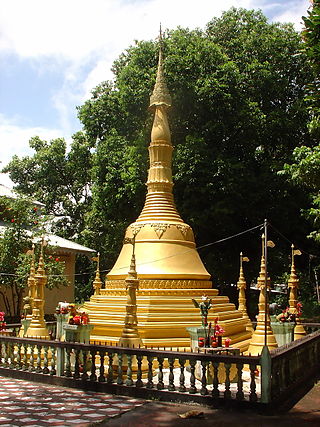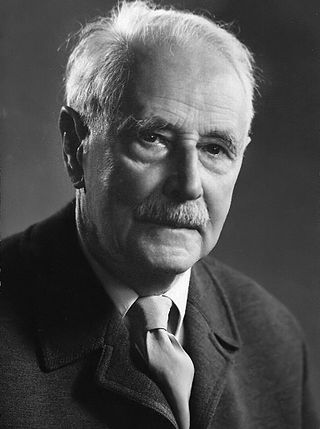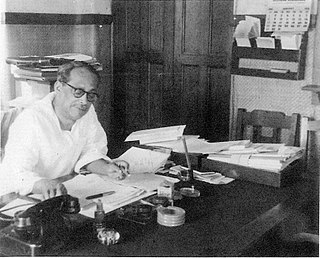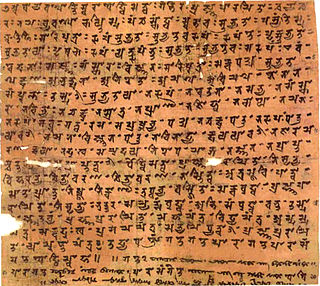Indology, also known as South Asian studies, is the academic study of the history and cultures, languages, and literature of the Indian subcontinent, and as such is a subset of Asian studies.

Hajime Nakamura was a Japanese Orientalist, Indologist, philosopher and academic of Vedic, Hindu and Buddhist scriptures.

The Māṇḍūkya Upaniṣad is the shortest of all the Upanishads, and is assigned to Atharvaveda. It is listed as number 6 in the Muktikā canon of 108 Upanishads.

Buddhism, also known as Buddha Dharma and Dharmavinaya, is an Indian religion or philosophical tradition based on teachings attributed to the Buddha. It originated in present-day North India as a śramaṇa-movement in the 5th century BCE, and gradually spread throughout much of Asia via the Silk Road. It is the world's fourth-largest religion, with over 520 million followers (Buddhists) who comprise seven percent of the global population.

Moriz Winternitz was a scholar from Austria who began his Indology contributions working with Max Müller at the Oxford University. An eminent Sanskrit scholar, he worked as a professor in Prague in the German part of Karl-Ferdinands-Universität after 1902, for nearly thirty years. His Geschichte der indischen Literatur over 1908-1922 period was a major and comprehensive literary history of Sanskrit texts. The contributions on a wide range of Sanskrit texts by Winternitz have been an influential resource for modern era studies on Hinduism, Buddhism and Jainism.

Gauḍapāda, also referred as Gauḍapādācārya, was an early medieval era Hindu philosopher and scholar of the Advaita Vedanta school of Hindu philosophy. While details of his biography are uncertain, his ideas inspired others such as Adi Shankara who called him a Paramaguru.

The roots of Buddhism in Poland can be found in the early 20th century in the nation's connections to the origin countries of the religion, like Vietnam, China, Japan, and Korea. After World War II, primarily expatriate Poles joined various Buddhist groups and organizations. Since the breakdown of the Eastern Bloc, which had promoted an antireligious campaign, Buddhism has been able to develop further in the more tolerant atmosphere.

The Barua, are an ethnic group native to Chittagong Division in Bangladesh, Rakhine State in Myanmar, where they are known as the Maramagyi or Maramagri, and parts of Assam, West Bengal and Tripura in northeast India. According to Arakanese chronology, the Barua Buddhists have lived there for five thousand years. Another derivation of 'Barua' is 'Baru' and 'Arya' meaning great arya. They are commonly identified by their last name, "Barua". Barua is derived from "Baru" meaning "great" and "ua", meaning "noble rulers". In Myanmar, the Barua is classified as one of the seven groups that make up the Rakhine nation. Originally, the Barua title is of Assamese origin.
Richard Francis Gombrich is a British Indologist and scholar of Sanskrit, Pāli, and Buddhist studies. He was the Boden Professor of Sanskrit at the University of Oxford from 1976 to 2004. He is currently Founder-President of the Oxford Centre for Buddhist Studies. He is a past president of the Pali Text Society (1994–2002) and general editor emeritus of the Clay Sanskrit Library.

The Buddhist and Pali University of Sri Lanka is a Buddhist university in Homagama, Sri Lanka. It was founded in 1981 and is organized in two faculties.

George Nicolas de Roerich was a prominent 20th century Tibetologist. His name at birth was YuriNikolaevich Rerikh. George's work encompassed many areas of Tibetan studies, but in particular he is known for his contributions to Tibetan dialectology, his monumental translation of the Blue Annals, and his 11-volume Tibetan-Russian-English dictionary.
Buddhist studies, also known as Buddhology, is the academic study of Buddhism. The term Buddhology was coined in the early 20th century by the Unitarian minister Joseph Estlin Carpenter to mean the "study of Buddhahood, the nature of the Buddha, and doctrines of a Buddha", but the terms Buddhology and Buddhist studies are generally synonymous in the contemporary context. According to William M. Johnston, in some specific contexts, Buddhology may be viewed as a subset of Buddhist studies, with a focus on Buddhist hermeneutics, exegesis, ontology and Buddha's attributes. Scholars of Buddhist studies focus on the history, culture, archaeology, arts, philology, anthropology, sociology, theology, philosophy, practices, interreligious comparative studies and other subjects related to Buddhism.

Walter Liebenthal (12 June 1886 – 15 November 1982), was a German philosopher and sinologist who specialized in Chinese Buddhism. He translated many philosophical works from Pali, Sanskrit and specially from Chinese into German. Based upon his extensive research in Indian Buddhism and Chinese religion, one of his main conclusions was that early Chinese Buddhism through Ch'an (Zen-) was not a Chinese version of Indian Buddhism, but rather, that it developed from Taoism, a Chinese religion. Indian concepts are present, but at the core it represents a Chinese perspective.

Prabodh Chandra Bagchi or P. C. Bagchi was one of the most notable Sino -Indologists of the 20th century. He was the third Upacharya (Vice-Chancellor) of Visva-Bharati University.

Benimadhab Barua was an Indian scholar of ancient Indian languages, Buddhism and law. He was a prominent educationist and writer.

Lal Mani Joshi was a Buddhist scholar and professor of comparative religions and Buddhist studies in a number of distinguished universities of India and USA.

P. D. Premasiri is a Buddhist scholar specializing in the areas of Buddhist ethics and Buddhist philosophy. Premasiri's academic training represents a synthesis of both the Buddhist and Western philosophical traditions, first at the University of Peradeniya and subsequently at Cambridge and Hawaii. He is currently president of the Buddhist Publication Society and professor emeritus in the Department of Pali and Buddhist Studies at the University of Peradeniya.
Johannes Bronkhorst is a Dutch Orientalist and Indologist, specializing in Buddhist studies and early Buddhism. He is emeritus professor at the University of Lausanne.
Ludo Rocher (1926–2016) was an eminent Sanskrit scholar, and the W. Norman Brown Professor Emeritus of South Asia Studies at the University of Pennsylvania.

Sanskrit Buddhist literature refers to Buddhist texts composed either in classical Sanskrit, in a register that has been called "Buddhist Hybrid Sanskrit", or a mixture of these two. Several non-Mahāyāna Nikāyas appear to have kept their canons in Sanskrit, the most prominent being the Sarvāstivāda school. Many Mahāyāna Sūtras and śāstras also survive in Buddhistic Sanskrit or in standard Sanskrit.















